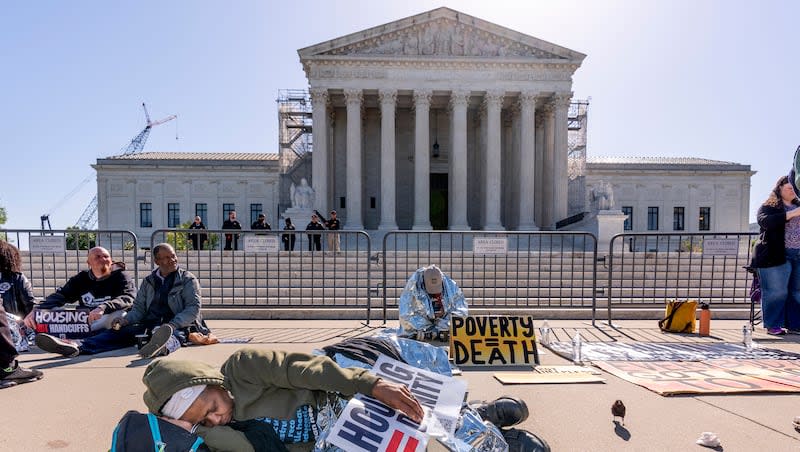Do bans on public sleeping turn homelessness into a crime?

Homelessness is a challenge for cities across the country and especially in the West, where warmer temperatures can lead to larger communities of unhoused men and women.
Cities often combat the issue with a diverse mix of programs and policies, offering warming centers or shelters but also banning behaviors like public urination or camping downtown.
The Supreme Court on Monday debated whether cities have gone too far with the policy approach and gotten to the point where they’ve turned homelessness into a crime.
The case centers on a law that criminalizes public sleeping and asks whether that law constitutes cruel and unusual punishment since there are more homeless men and women in the area than shelter beds.
The court’s ruling, expected by the end of June, could reshape responses to homelessness nationwide.
City of Grants Pass v. Johnson
The Supreme Court case on homelessness involves the city of Grants Pass, Oregon, which has “a population of approximately 38,000 and as many as 600 people experiencing homelessness on any given day,” according to SCOTUSblog.
Although the city has both secular and faith-based shelters, some unhoused men and women regularly sleep outside, whether due to a lack of beds or discomfort with the available services.
In response, the city has passed ordinances that ban sleeping on public property in the city limits, whether the sleeping occurs in a tent, on a cardboard box or on a bench with a blanket.
“The ordinances impose a $295 fine for violations, with the fine increasing to more than $500 if it is unpaid. After two citations, police officers can issue an order that bans the individual from city property; a violation of that order exposes the individual to conviction on criminal trespass charges, which carry penalties of up to 30 days in jail and a $1250 fine,” SCOTUSblog reported.
In 2018, three members of the homeless community in Grants Pass sued the city, arguing that enforcement of the ordinances violates the Eighth Amendment, which prohibits cruel and unusual punishment. You can’t punish people without homes for sleeping outside if you don’t have enough shelter beds for them, they say.
City officials have defended the policies, arguing that they promote public safety and help city leaders connect people experiencing homelessness with meaningful services.
The lower courts, including the 9th U.S. Circuit Court of Appeals, ruled against Grants Pass, deciding that punishing homeless men and women for sleeping outside does represent cruel and unusual punishment in this case.
Supreme Court response
The 9th Circuit ruling in favor of members of the homeless community was controversial, in part because it did not include beds offered by faith-based shelters in its count of available shelter beds in Grants Pass.
The Becket Fund for Religious Liberty filed an amicus brief to the Supreme Court highlighting this omission, arguing that the ruling offered an inaccurate assessment of how the city is dealing with its homelessness crisis.
Some also questioned the broadness of the 9th Circuit’s ruling. The Biden administration, for example, has said that the legal system should promote individualized assessments of a homeless person’s status and sleeping options, rather than prohibiting public sleeping bans across the board, according to SCOTUSblog.
During oral arguments Monday, Supreme Court justices appeared divided over Grants Pass’ approach to homelessness. Some justices, including the three more liberal ones, appeared to think that the ordinances do turn homelessness into a crime, while others expressed doubt that the Eighth Amendment should apply.
Nearly all wondered if bans on public camping are actually effective and questioned whether a courtroom is the right place to find meaningful solutions to the homelessness crisis.
“Why would you think these nine people are the best people to judge and weigh those policy judgments?” Chief Justice John Roberts asked at one point on Monday, according to The Washington Post.
Supreme Court experts believe it’s unlikely that the justices will fully uphold the 9th Circuit’s ruling. Instead, they may try to issue a more narrow ruling that gives members of the homeless community more protections without doing too much to disrupt public safety laws.
“The one point that all of the justices and attorneys seemed to agree on: Solving homelessness is complicated,” The Washington Post reported.

